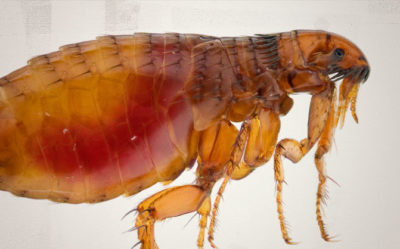
Image source: pet365.co.uk
When we adopted two shelter kitties, we checked them carefully for fleas. Unfortunately, their long fur must have hidden the signs. Within a few days at home, both kittens were visibly scratching, and I was worried.
I knew from a childhood experience how quickly fleas can spread from a pet throughout the entire home. Since time was of the essence, and I did not want to spray harmful chemicals inside my home, I began investigating natural options for getting rid of fleas. Along with that experience and others since then with other animals, I have learned a few lessons (some of them the hard way).
Here they are:
- Fleas reproduce rapidly. One female flea can lay up to 50 eggs per day and as many as 2,000 eggs in her lifetime.
- Fleas can dwell in your carpet, in your bedding, in your furniture and in your floorboards for a surprisingly long time. Getting rid of fleas naturally involves treating multiple parts of your home.
- Fleas like warm, moist conditions, but they can survive in cold, dry conditions. They simply become inactive.
- If fleas are biting your pet, they will soon be biting you if you don’t do something.
- Natural flea remedies do work, but they need to be repeated regularly in order to work well.
- Your vacuum is your friend in flea control, but you must empty the bag or canister each time you vacuum. That means in a trashcan away from your home.
Now, here are some natural flea remedies.
1. Boric acid – First, vacuum your home thoroughly, including furniture and baseboards. Then sprinkle boric acid powder lightly over all carpeted areas, including closet floors and under furniture. Work the powder into your carpet with a push broom. Boric acid kills fleas and the larvae by dehydrating them and drying them out. Let it remain overnight (or longer, if possible) before vacuuming and throwing away the vacuum contents.
2. Diatomaceous earth — You may sprinkle food-grade diatomaceous earth into your dog or cat’s dry coat. Wearing gloves, gently massage it into the coat, avoiding the animal’s eye area. You also can use a flea comb to distribute the powder. It is a good idea to wear a surgical mask so you don’t breath in the dust (although it is non-toxic).
Diatomaceous Earth: The Best Chemical-Free, All-Natural Insecticide — For Your Home AND Garden
Next, sprinkle diatomaceous earth on your carpets, rugs, floors, baseboards and furniture. Again, sweep or brush it in lightly and let it set overnight or longer before vacuuming and then throwing away the vacuum contents. Let it remain on baseboards. (Note: DE may cause your pet’s skin to become very dry. Consult your vet for tips.)
 3. Salt – Sprinkle fine table salt or sea salt onto your rugs, carpet and furniture. The salt adheres to both adult fleas and larvae and dehydrates them. Leave the salt in for about a week before vacuuming. Repeat at least three times for best results.
3. Salt – Sprinkle fine table salt or sea salt onto your rugs, carpet and furniture. The salt adheres to both adult fleas and larvae and dehydrates them. Leave the salt in for about a week before vacuuming. Repeat at least three times for best results.
4. Baking soda — Used alone or in combination with salt, baking soda also dehydrates fleas and flea larvae. Sprinkle equal amounts of baking soda and salt on dry carpet. Please note: If your carpet gets wet during the treatment, the baking soda can leave behind a white residue.
5. Soap and water – In addition to washing bedding, bathing your pet frequently in soapy water can work wonders. Fleas cannot hold onto the animal’s wet hair, and the insects simply drown. In addition to treating your carpets, launder all pet bedding and human bedding frequently to get rid of flea eggs. You also can catch adult fleas and drown them by leaving out a pan of soapy water under a bright light.
6. Rosemary – You can brew a soothing rosemary bath for your dog. In addition to drowning the fleas, the rosemary will soothe the dog’s itchy skin. Here’s how to prepare the water: Combine two cups of fresh rosemary leaves with two pints of boiling water. Boil for 30 minutes. Then strain the rosemary leaves out and discard them. Add another six pints of warm water to the mixture to make one gallon of solution. After the mixture has cooled, pour it gently over your pet’s coat. Do not rinse. Please note: Vets do not recommend this treatment for cats.
7. Apple cider vinegar – You also can deter fleas on your pets by spraying a solution of equal parts water and apple cider vinegar onto their fur. Comb it in with a flea comb. Avoid the eye areas.
Some pet owners have had success by adding brewer’s yeast and raw garlic (dogs only) to their pets’ food. If they will drink it, you also can try adding unpasteurized apple cider vinegar to your pets’ water bowls as well. A teaspoon added to the water bowl just twice a week helps as a flea deterrent and is good for your pet’s overall health.
Getting rid of fleas naturally is not a one-and-done kind of thing. Because of the flea’s three-day reproduction cycle, it is important to repeat procedures to eliminate adults and their offspring.
What are your all-natural ways to get rid of fleas? Share your thoughts in the section below:
If You’re All-Natural, Then You Need To Know All The Uses For Hydrogen Peroxide. Read More Here.
 Off The Grid News Better Ideas For Off The Grid Living
Off The Grid News Better Ideas For Off The Grid Living




